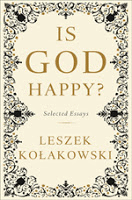Is God Happy? Selected Essays
Leszek Kolakowski. Basic Books, 2013. 327 pages. $28.99.
By David Madden
Kolakowski’s title Is God Happy? is an effective marketing tool, but it is misleading. The shortest—four pages—of the twenty-seven essays, it does not express the essence of the collection, which deals with a wide spectrum of the most significant ideas of modern times.
One may well expect to find in these essays traces of subjects of his previous thirty books, only twelve of which have been translated: Marxism, religion, freedom, fame, lying, betrayal, modernity, myth, Bergson, Husserl. Two of the titles are especially intriguing: Why Is There Something Rather Than Nothing? (Basic Books, 2007) and God Owes Us Nothing (University of Chicago Press, 1998).
The essays are arranged under three headings. The first, “Socialism, Ideology and the Left” offers Kolakowski’s thinking on socialism, Marxism, communism as a cultural force, totalitarianism, genocide, anxiety about God, and the heritage of the left, among others. Reaction to “The Death of Gods,” in which he exposes five myths about communism, resulted in his being forbidden to teach or publish; it was not published until after the end of communism in Poland. The longest piece in the book, “My Correct Views on Everything,” is a “rejoinder” to E. P. Thompson, a controversial historian and socialist, whose views on socialism conflict with Kolakowski’s.
Section II, “Religion, God and the Problem of Evil,” offers perspectives on Jesus Christ as prophet and reformer, on anxiety about God, and an especially interesting piece called “Leibniz and Job: The Metaphysics of Evil And The Experience of Evil.” “The person who thinks dialectically says that when we talk about an action being right or wrong according to the circumstances, we are never talking abut the same action; the similarity is only ostensible, merely superficial.”
In section III, “Modernity, Truth, the Past and Some Other Things,” he examines such universal themes as crime and punishment, natural law, relativism, truth, reason, and the apocalypse. “The Demise of Historical Man” is one of the more provocative pieces. “Thus ‘historical man’ committed suicide and was resurrected—as nihilistic man.”
Readers familiar with the most rigorous methods of philosophical inquiry may agree with Kolakowski when he says, quite often, “All this…is well-known.” But the general reader may find his way of thinking, conducted with a rather communal eagerness, clear, concise, and revealing. For example, here is a passage from “Is God Happy?”:
“The question is not absurd. Our conventional view of happiness is as an emotional state of mind. But is God subject to emotion? Certainly, we are told that God loves His creatures, and love, at least in the human world, is an emotion. But love is a source of happiness when it is reciprocated, and God’s love is reciprocated only by some of His subjects, by no means all: some do not believe that He exists, some do not care whether He exists or not, and others hate Him, accusing Him of indifference in the face of human pain and misery. If He is not indifferent, but subject to emotion like us, He must live in a constant state of sorrow when He witnesses human suffering. He did not cause it or want it, but He is helpless in the face of all the misery, horrors and atrocities that nature brings down on people or people inflict on each other… He takes part in our sufferings, and feels sorrow. In either case, God is not happy in any sense we can understand.”
The informality of these essays is apparent when one looks for but fails to find reference notes, bibliography, or index.
One may not concur with the New York Sun that Kolakowski “is one of the greatest thinkers of our time,” but the general reader may be glad to have this collection in hand, for review or discovery.
David Madden (ΦBK, University of Tennessee, 1979) is a novelist and resident member of the Epsilon of Tennessee chapter of Phi Beta Kappa. HIs most recent novels are Abducted by Circumstance and London Bridge in Plague and Fire. Forthcoming is his third collection of stories, The Last Bizarre Tale.




